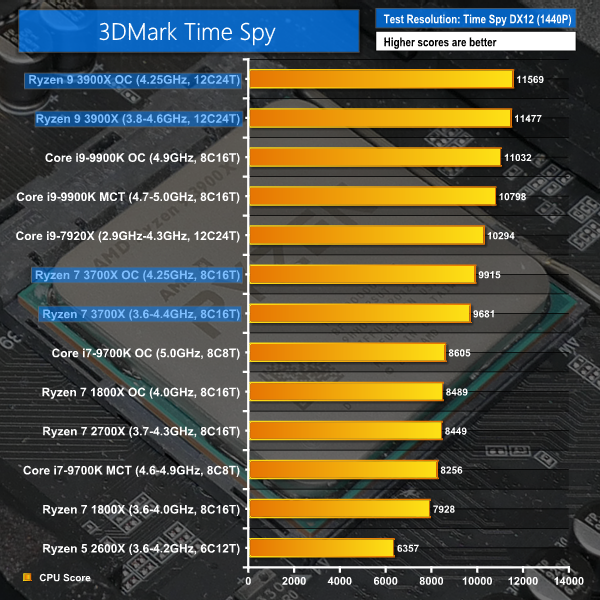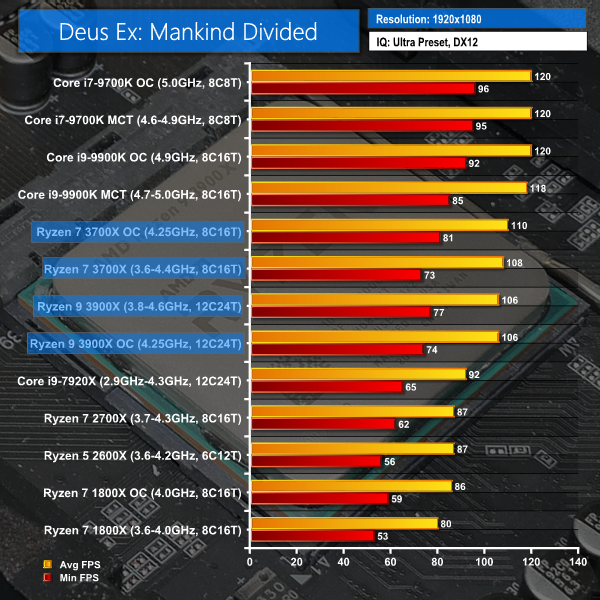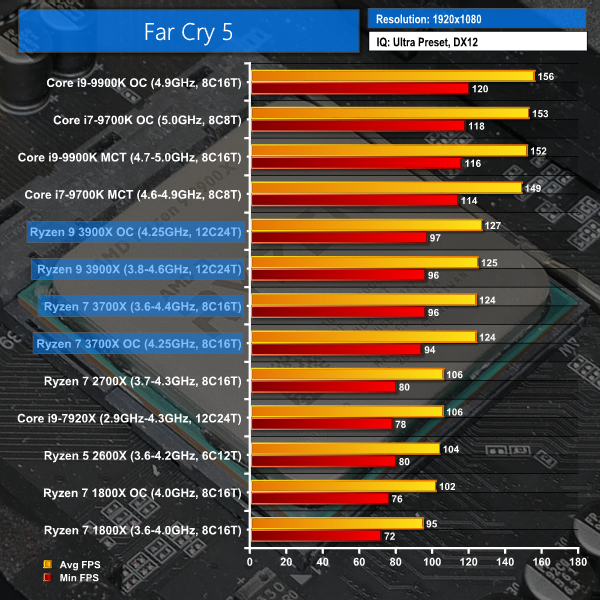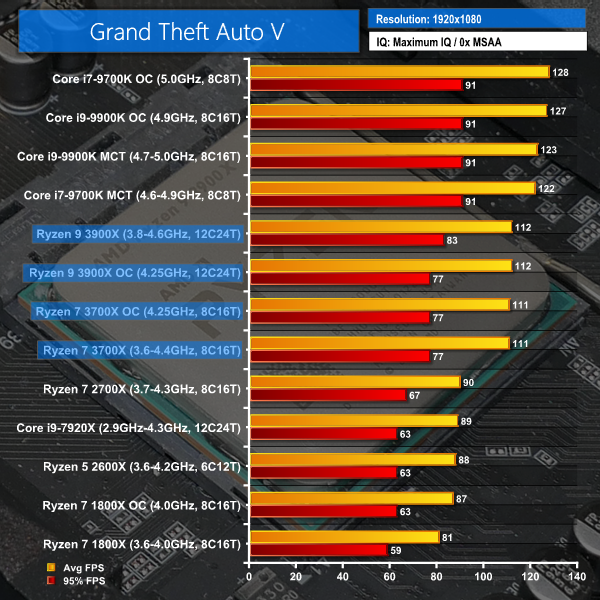3DMark
Deus Ex: Mankind Divided
Despite its age, Deus Ex: Mankind Divided remains a demanding title even for modern hardware. We use the game's built-in benchmark with quality set to Ultra, MSAA disabled, and DX12 mode.
Deus Ex: Mankind Divided gives us an early indication of AMD’s Zen 2 gaming performance. Running at the high refresh rates permitted by the popular 1080P resolution and a Gigabyte Aorus RTX 2080 Ti graphics card, we see that Intel still rules the show when it comes to all-out gaming performance.
AMD has, however, made significant strides in closing the performance gap to Intel’s Skylake-based CPU. Rather than the roughly 30% performance deficit we see with Zen and Zen+ versus the Coffee Lake i9 and i7, Ryzen 3000 manages around 90% of the performance offered by Intel’s market leaders. Both Ryzen 3000 chips are able to push past 100 FPS, making them valid options for high refresh rate gamers.
Far Cry 5
We use the Far Cry 5 built-in benchmark with quality set to Ultra.
Far Cry’s Dunia engine tends to favour Intel hardware and that’s exactly what we see in our chart. With the Intel chips hovering around 150 FPS on average, AMD’s Ryzen 3000 sits closer to 125 FPS and with lower minimums. Again though, AMD’s Zen 2 gaming improvements have managed to reduce the deficit to the Coffee Lake i7 and i9 from around 30-35% in the cases of Zen and Zen+ to around 15% for Ryzen 3000.
Put into context, however, Ryzen 3000 delivering 85% of the Core i9-9900K’s gaming performance with a game engine that tends to prefer Team Blue can be considered a solid result for AMD. The average performance of the Ryzen chips at more than 120 FPS means that high refresh rate gamers can still justifiably consider the AMD processors for their gaming or multi-purpose machine, despite their numerical performance disadvantage versus Intel.
Versus 3200MHz CL14 RAM, 3600MHz C16 DDR4 with the Ryzen 9 3900X delivers a 3.5% performance improvement for average and minimum FPS in Far Cry 5.
Grand Theft Auto V
Grand Theft Auto V remains an immensely popular game for PC gamers and as such retains its place in our test suite. The DX11-built game engine is capable of providing heavy stress to a number of system components, including the GPU, CPU, and Memory.
We run the built-in benchmark using a 1080p resolution and generally Maximum quality settings (including Advanced Graphics).
Old but still immensely popular, GTA V gives us a good look at how a CPU-demanding title coded with the limitations of the DX11 API performs on Ryzen 3000.
Unsurprisingly, Intel wins again. The highly-clocked 9900K and 9700K prove just how desirable fast frequencies are to games. Averaging between 120 and 130 FPS, the two Intel chips outperform their Ryzen 3000 rivals by a little over 10% on average. 95% FPS values are also superior on the Intel chips, proving their respective thread count deficit to be a non-factor for GTA V.
Taking a step back and looking at AMD’s performance, it is impressive to see Ryzen 3000 now offering around 90% of the gaming performance of Intel’s market leaders, compared to the 65-75% values we see with Ryzen 1000 and 2000. No longer are you forced to go Intel if you want to consistently push a title such as GTA V past 100 FPS on a high refresh rate monitor. That’s good to see, even if Intel does still offer the outright fastest gaming performance in GTA V.
 KitGuru KitGuru.net – Tech News | Hardware News | Hardware Reviews | IOS | Mobile | Gaming | Graphics Cards
KitGuru KitGuru.net – Tech News | Hardware News | Hardware Reviews | IOS | Mobile | Gaming | Graphics Cards










